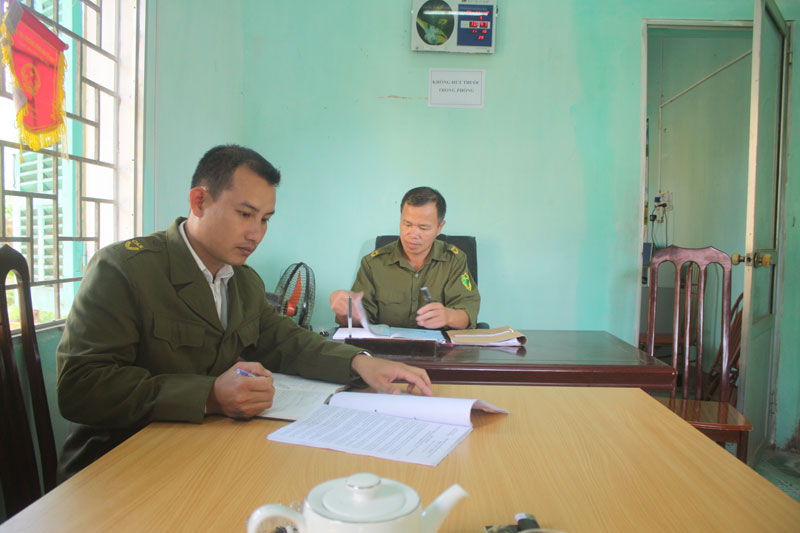
(HBO) – Before 2006, security conditions and drug-related crime in Mo village of Chieng Chau commune (Mai Chau district) were complicated. The number of addicts sharply rose, causing a hike in cases of law violation, especially burglary and robbery, thus badly affecting local people’s lives.

Police in Chieng Chau commune (Mai Chau
district) handle tip-off from the self-managing group of families on security
to prevent behaviours disturbing the life of locals in the commune.
The Party Committee and People’s Committee
of the commune assigned the Party cell in Mo village and head of the village to
work with the Fatherland Front branch on the establishment of the self-managing
group of families on security. Those families would help each other in economic
development and keep watch on their own relatives, preventing them from falling
into law violation and drugs addiction.
Six months after the start of the model’s
operation, crime, law violation cases and social evils were significantly
reduced. Conflicts were solved right at the village. On the basis of the
result, the People’s Committee of the commune decided to expand the model.
After 12 years, from just one group, the
commune is currently having 36 self-managing groups of families on security,
with all of the 927 households participating.
All groups devised their regulations, action
plans and elected their management boards, communication committees to manage
all activities. The groups hold a meeting once in two months. In case of
emergency on security and order, they will hold an urgent meeting to address
the issue and share experiences.
The self-managing groups of families on
security have encouraged all residents and households to proactively maintain
security and order, enhance prevention of crime and drugs, prostitution and
HIV/AIDS. They also contribute to reducing traffic accidents, superstition,
child marriages, burglary, robbery and other social evils in the commune.
With this model, local people have proactively
prevented and denounced criminals. When members of the groups show signs of
violation toward the law and groups’ regulations, they will receive warnings
and be prevented.
In 2017 and the first six months of 2018,
police in Chieng Chau received more than 20 tip-offs from the groups, which
helped prevent activities affecting security conditions in the locality./.
The Department of Education and Training of Hoa Binh province held a conference on March 18 to review the performance of the "Safe and Happy School" Project and set out tasks for 2025. The project, funded by the Taiwan Fund for Children and Families (TFCF), aims to create a safe, inclusive, and supportive learning environment for students. The event saw the attendance of representatives from the TFCF and 26 beneficiary schools.
With over 70% of their workers being women, trade unions across industrial parks (IPs) in Hoa Binh have been actively safeguarding their legal rights and interests while implementing initiatives to improve their income and well-being.
In recent years, the Hoa Binh provincial General Hospital has continuously innovated itself and improved the quality of medical services to meet the increasing needs of local people. With substantial investments in infrastructure and modern equipment, along with a team of highly qualified doctors and nurses, the hospital has gradually established itself as one of the leading medical units in the Northwestern region and a trusted destination for healthcare for people inside and outside the province.
From mastering the fundamentals of programming to achieving national recognition, the Programming Club of the Le Van Tam Primary School (STAR LVT28) in Hoa Binh city has made remarkable strides in the field of robotics.
The Ho Chi Minh Communist Youth Union Committee and the Vietnam Youth Federation chapter of Hoa Binh province organised a programme on March 12 to launch the "Digital Literacy" movement and an online quiz on the resolutions of the Vietnam Youth Federation congresses at all levels, as well as the Politburo's Resolution No. 57-NQ/TW on breakthroughs in the development of science, technology, innovation, and national digital transformation.
As climate change grows more unpredictable, the development of production forests has become essential - not just for economic growth, but for safeguarding the environment and maintaining ecosystem balance. By boosting local incomes, curbing natural disasters, preventing soil erosion, and protecting water resources, these forests play a crucial role in sustainable development.



